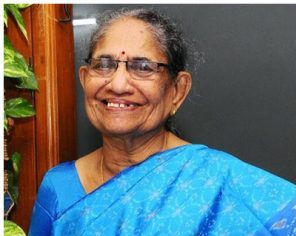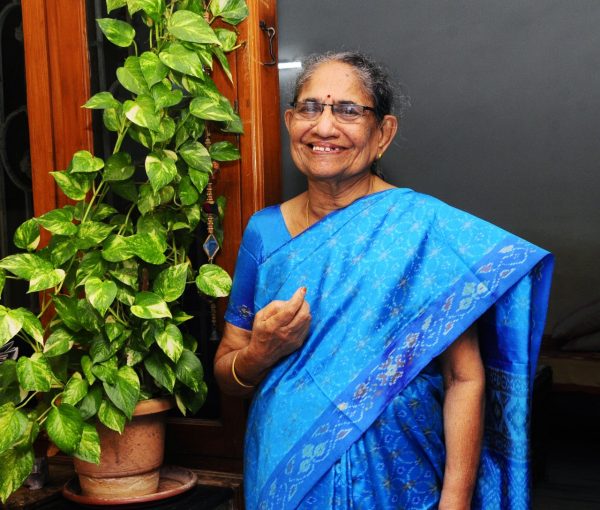
HERE I AM and other stories
9. Nameless
Telugu Original: P.Sathyavathi
English Translation: R. Srivatsan and Sreelakshmi
Manklets and tiny gold drop earrings. She looks at them,
‘ alachmi sits on the threshold, holding silver her eyes brimming with tears. She has been sitting like this for six months. The madam in whose house she once worked comes by in her car, stops and says, ‘Come Malachmi, let’s go home.’ Malachmi responds angrily, ‘I can’t work any longer, Amma. I asked you to look for someone else, didn’t I? Why don’t you listen to me?’
‘I am not asking you to come to work. Just come . . . Let us talk a little.’
‘What will you talk about? You have a hundred things to do . . . What would you know about my child? I won’t come to your house,’ says Malachmi, looking the other way.
The madam leaves with a sigh.
Nowadays, Malachmi responds with irritation when anyone approaches her.
Any attempt to recall the old Malachmi is of no avail.
Malachmi sits with her head in her hands, leaning against a pillar at the entrance to the police station. As her husband and son talk to the sub-inspector, she wipes her tears and looks in once in a while.
They come out a little later. Ravindra Babu, the owner of the car her son drives, also comes out along with them. He looks at Malachmi and says, ‘They have recorded the complaint, my dear! Now go home. They will find her. I will keep in touch with them.’
‘Come! Let’s go, sitting here won’t help,’ her husband chides her.
Her son seats the owner in the car and drives him away.
At first, Malachmi hopes that perhaps the owner might say, ‘Poor things, give these people a ride home,’ then thinks, ‘He’s not mad!’ and follows her husband reluctantly.
He strides ahead and she follows.
Her feet are leaden and she hasn’t eaten for two days. Perhaps her husband will take her in a rickshaw, she thinks. He walks on. This is just like him – when he is angry, he walks away briskly without a backward glance. She has ten rupees. There are no cycle-rickshaws around. At that point, a share auto comes by and she gets in. She wonders whether to ask her husband to get in, but he is far ahead. ‘To each his lot,’ she thinks and settles down.
As they reach home, people around ask, ‘What did the police say?’
Don’t they know what the police say? she wonders.
Her husband says, ‘Enough now. Have some tea and cook some rice. It is god’s will. How much will you weep?’ He takes off his head cloth, slings it across his shoulder and walks out. A golden girl! What demon carried her away! She was being tutored by a man because she scored poorly in English. The girl who had gone to study hadn’t returned. Her grief brims over. She wails aloud and sits on the doorstep.
Yesterday morning, when she and her son had gone to the police to complain, what had that bastard policeman said? ‘She may have eloped with someone! She will enjoy herself for a few days and return. Meanwhile, don’t pester us.’ But had he written a complaint? No! He wouldn’t write one unless you drove down to him in a car, wearing ironed clothes and gold rings on four fingers, would he?
‘Still sitting on the threshold, are you? Get up and light the stove! Sinners will pay! You were the one who made this happen. Of what use are tears now? Go on! Cook. Or you will get dizzy with hunger and die,’ says Malachmi’s husband.
Malachmi neither says a word, nor gets up. He goes in, lights the stove, makes some tea and brings it to her. When she refuses, he scolds her and forces her to drink it.
‘Why weep now, after everything you’ve done?’ he shouts. Then, relenting, ‘Poor thing, what will you do? You thought everything would be fine. If we just keep weeping, no one will plead with us to eat our food. Come on . . .’ he consoles her.
‘They will find her, Amma! Don’t grieve – my saar too said he would keep asking them, didn’t he? Tell your madam too. She has an organization, doesn’t she?’ says her son, as he arrives.
Malachmi gets to her feet after a long time. She doesn’t stop shedding tears. Her madam comes in. She wants to know why Malachmi has not reported for work for three days. Malachmi takes her hand and sobs. ‘Ask your organization to find out about my daughter’s whereabouts, Amma,’ she cries. Madam says she will, and continues, ‘But won’t you come in to work now?’
‘I can’t, Amma,’ she says and recounting stories about her daughter, begins to sob.
‘Don’t be afraid, nothing will happen to your daughter.
She will return,’ her madam consoles her and leaves. A week passes! And then ten days.
One day, when news comes from the police station, she prays to the god on her shelf, pleads forgiveness and runs.
‘A body was washed ashore at the Bandar Locks! Here are the langa, oni and earrings – see if they belong to your daughter.’
She breathes, ‘Oh my daughter – it shouldn’t be you, it shouldn’t be you,’ and goes to take a look. It isn’t her. ‘My heart shook, poor girl. I wonder whose daughter she is! Oh, my dear!’
Another time, a girl is found on the railway tracks, her head severed from her body, wearing her earrings and oni. ‘Oh
Amma, this is not my daughter, oh lord.’
‘We caught girls we found in Bombay and brought them.
One said she was from this village. Take a look at her.’
‘She’s not my daughter, sir! We are dying – between the police station, the canal and the railway tracks . . . A body every two or three days! Why, my lord, are so many children dying! What happens to them? Why do they die when everything is provided to them?’
Bodies arrive in a continuous stream.
‘It has been a long time since your child disappeared, hasn’t it? These are all new corpses. She may have eloped with someone. Just keep quiet,’ say the relatives and neighbours.
‘Doesn’t Ravindra Babu have any other work? How many times will he be able to go to the police? Your madam is involved in meetings, demonstrations and candlelight vigils. Does she have only this one problem of ours on her mind? We will lean on god’s shoulder and get back to our duties,’ says Malachmi’s son.
Beating his head with his hands, Malachmi’s husband laments, ‘Did she listen when I tried in so many ways and cried out in vain, “She doesn’t need an education”? Both mother and daughter made a racket, saying she had to be eighteen to marry. “I will go to school, Nanna, I will study!” What happened? The child has gone, and so has the education.’ He then turns on Malachmi, berates her, and then comforts her. He feeds her.
The son drives off in the car as soon as he wakes up. He returns only after ten at night.
Malachmi’s husband had suggested that they marry their daughter off to Veerabhadra, his sister’s son, as soon as she passed her class X exams. ‘I will die before I marry him, Nanna! I can’t live in that village. I will study; I am only sixteen. They will throw you in jail if you get me married when I am only sixteen,’ said the daughter. Arguments, arguments . . .
‘Veerabhadra is a good man. His mother is also a good woman. He has a house. He is a tenant farmer.’
Malachmi supported their daughter – as if the girl would attain high educational qualifications and become an IAS officer!
Since the girl was going to college, they bought her good chappals and clothes.
Where did we fall short? She was a good girl, too. No boyfriend. The police checked her bags and clothes, but didn’t find any clues of bad intentions. There was nothing except lessons and notes – no love letters. She had no mobile phone. She had asked for one once or twice, but they refused. Had they bought her one, perhaps she would have called up her brother in case of a problem. The father is shaken by this thought. ‘Perhaps it would have been better if we had bought her a phone, Lachmi,’ he says, wiping a tear off his face.
‘Perhaps it would have been better if somehow we had convinced her to get married, ’ says Malachmi.
The son says, ‘What would she have done with this useless intermediate education? What is it if not a way of passing the time? Was I educated? Education’s a waste – useless!’
Three months after the girl disappeared, her friend, Nagamani was withdrawn from college and married off. Early marriage has now become the common practice.
Malachmi, who could work with ten hands, now finds that her ten hands are lifeless; she has no life in any of them. Every day, she looks at the silver anklets and tiny gold drop earrings she had bought for her daughter without her husband’s knowledge, paying for them with her own backbreaking labour. She sits on her doorstep and looks out for her daughter each day. Her family’s livelihood has suffered a blow on account of her idleness. The father’s and son’s earnings are just about enough for the upkeep of the family.
They continue to identify corpses. Malachmi’s husband finally says, ‘We can’t come now, swami, let us go. It is now six months.’ He folds his hands in half-mock respect to the police.
‘What is this, sir! One month to run away for love! Three months for a family! Three months for a pregnancy! One week to abandon a girl! Two days to die . . .’ laughs an experienced policeman. If he had told Malachmi this, she would have beaten him without restraint and gone to jail. The husband controls himself, salutes the policeman and comes away. ‘I want a daughter, not a corpse,’ he says.
‘Now, she hasn’t eloped, she hasn’t drowned in the canal, yet she hasn’t returned home – what could have happened to her? Why don’t a group of men and women discuss this in a panel on television? Is it a crisis only when city girls are lost?
What about rural girls? I will light candles for my daughter,’ says Malachmi and lights seventeen candles on her doorstep.
*****
(to be continued..)

పి. సత్యవతి గుంటూరు జిల్లా కొలకలూరులో 1940 జులై 2న జన్మించారు. ఆంధ్రవిశ్వకళాపరిషత్ లో ఎం.ఎ. ఇంగ్లిషు పూర్తి చేశారు. విజయవాడలోని ఎస్.ఎ.ఎస్. కాలేజ్ లో అధ్యాపకులుగా పని చేసి పదవీవిరమణ పొందారు. ఆమెకు అపారమైన బోధానానుభవమే కాదు, తెలుగు, ఆంగ్ల సాహిత్యాలపై పూర్తి పట్టు ఉంది. అన్నిటికి మించి తెలుగు సమాజాన్ని క్షుణ్ణంగా దగ్గరనుంచి పరిశీలిస్తున్నారు. అందుకే నాలుగు దశాబ్దాల తెలుగు స్త్రీ, వారి రచనల్లో మనకు కనిపిస్తుంది. వీరి తొలి కథ 1964లో ఆదివారం కోసం రాశారు. దీనిలో ఆదివారమైనా స్త్రీకి సెలవు ఉండాలని, అది వ్యక్తిగతమైన పనులు చేసుకోడానికి అవసరమని వివరిస్తుంది. 1975లో మర్రినీడ కథా సంపుటి వీరిని రచయిత్రిగా పాఠకలోకానికి పరిచయం చేసింది. ఆంధ్రజ్యోతి సచిత్రవారపత్రిక ప్రచురించిన కథలలో పాఠకుల అభిప్రాయాల ద్వారా ఈ కథకు బహుమతి వచ్చింది. పి. సత్యవతి కేవలం కధా రచయిత్రే కాదు నవలలు, వ్యాసాలు, అనువాదాలు కూడా చేశారు.
